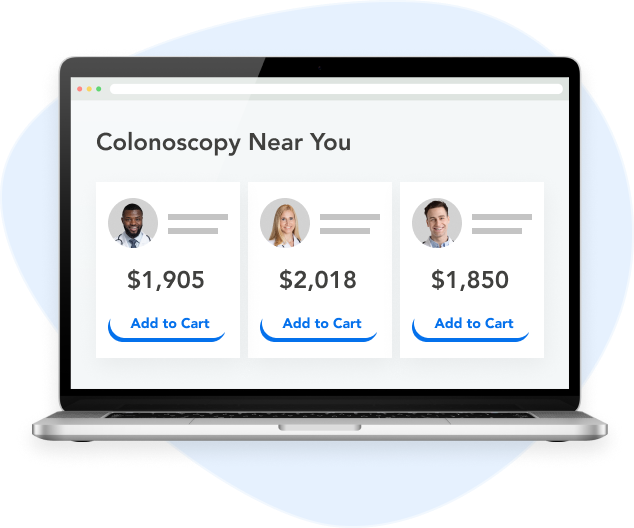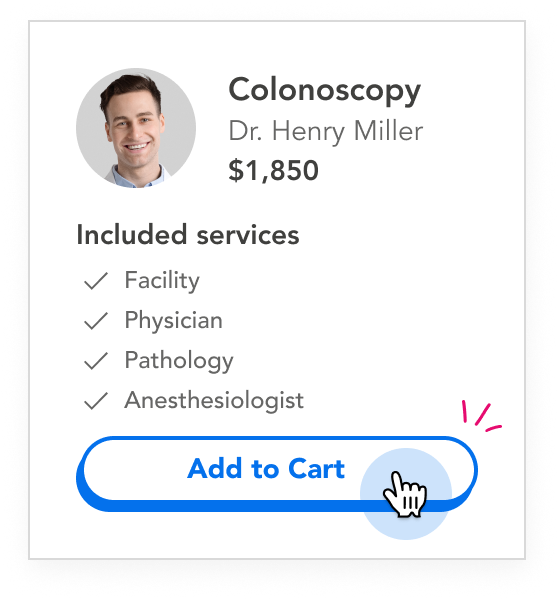Echocardiography with or without Color Doppler near Fishersville, VA
Save by purchasing this procedure online.
Similar Procedures: Transesophageal Echocardiography (TEE) (in office), Echocardiography with or without Color Doppler (in office), Transesophageal Echocardiography (TEE)
National Average 1,824
Regional Average1,020Save $804
Financing Options
Promotional financing available when you pay with CareCredit. $200 minimum purchase. What is CareCredit?
MDsave and Your Insurance
Contact your insurance company directly to see if your purchase can count towards your deductible. Details
Augusta Health
Cardiac Imaging
4.9
78 Medical Center Drive
Fishersville, VA 22939
Offered by

Money Back Guarantee
We will refund your payment in full if you end up not needing your purchased procedure and do not receive care. Details
Get Care In Three Easy Steps
Compare Upfront Prices

Search by procedure and location to browse local providers and compare upfront pricing.
Buy Your Procedure

Pay for your procedure online or by calling (844) 256-7696. Or buy your procedure at the facility before your appointment is scheduled.
Receive Your Care

Follow the scheduling instructions given by your provider. Bring your voucher to your appointment.
Frequently Asked Questions
View All FAQsProcedure Details
What is an Echocardiogram (Echo)?
An echocardiogram, also called an echo or diagnostic cardiac ultrasound, is a safe, noninvasive test that uses high frequency sound waves to create pictures of your heart and transmit them onto a video monitor. An echo records moving images of the heart’s chambers and the blood flowing through them, valves, walls, and blood vessels.1
Doctors may use an echo to determine the cause of cardiac symptoms like chest pain2 or heart murmur,3 to check for problems in the outer lining of the heart (pericardium) or blood vessels, or to identify blood clots or holes in the heart chambers.4
Why is an Echo Used?
An echo shows the heart’s structure and function, including:
- Heart size and shape
- Heart wall size, thickness, and movement
- Blood flow within the heart
- Heart beats & pumping strength
- Valve function
- Regurgitation (blood leaking backwards through a valve)
- Stenosis (narrowing of valves)
- Presence of tumors or infections5
- Heart rhythm problems or atrial fibrillation
What Types of Echo Are There?
- Transthoracic echocardiography: a standard echo, performed by passing a transducer across your chest.
- Transesophageal echocardiography: an echo performed by passing a transducer through a flexible tube directed into the esophagus. This type of echo may be recommended if you need more detailed pictures than a standard echo can provide.
- Doppler echocardiography: Doppler ultrasound techniques can be used as part of either transthoracic or transesophageal echo, or can be used to monitor the blood flow and pressure in the arteries. The sound waves bouncing off of blood cells change pitch as they move, and these changes, called Doppler signals, determine the blood’s speed and direction. Color doppler uses colorized images on the monitor to track blood flow.6
How Should You Prepare for Your Test?
Typically, you will have no special preparation for an echo. Your doctor may ask you not to eat for a few hours before a transesophageal echo, and afterwards, you may need to arrange a ride home if you are given a sedative.
What Can You Expect During an Echo?
During a transthoracic (standard) echo:
- You’ll be asked to undress from the waist up so the technician can attach sticky disks called electrodes to your chest.
- These will monitor your heart beat during the echo.7
- The technician, called a sonographer, will apply a gel to the transducer, which helps transmit the sound waves.
- The sonographer will pass the transducer across your chest and moving images of your heart will be transmitted to the video monitor.
- You may need to have an IV enhancing agent administered if your lungs or ribs interfere with the view.8
During a transesophageal echo:
- Your throat will be numbed and you will typically be given a sedative to help you relax.
- The transducer, inside a thin, flexible tube, will be guided through your throat into your esophagus to record images of your heart.
An echo typically lasts less than an hour, and most people can resume regular routines after the test. Your doctor may keep you for observation after an transesophageal echo.9
Does Health Insurance Cover an Echo?
Insurance coverage for echocardiography depends on your insurance company and often depends on the purpose of the test. For example, some medical insurance will cover an echo to diagnose symptoms, but not as a routine screening test.10 If you have a high deductible health plan, you will be responsible for your medical bills before your deductible is met. If you have to pay out of pocket, the price range of an echo in the MDsave network is updated in real time at the top of this page.
1,4,5,7 American Heart Association. “Echocardiogram (Echo).” https://www.heart.org/en/health-topics/heart-attack/diagnosing-a-heart-attack/echocardiogram-echo
2,6,8,9 Mayo Clinic. “Echocardiogram.” https://www.mayoclinic.org/tests-procedures/echocardiogram/about/pac-20393856
3 National Heart, Lung, and Blood Institute. “Heart Murmur.” https://www.nhlbi.nih.gov/health-topics/heart-murmur
10 Costhelper Health. “Echocardiogram cost.” https://health.costhelper.com/echocardiograms.html
Patient Reviews
4.8
What did you like most about using MDsave?
Lower price, multiple servicer options
What could we do to improve?
N/A
What did you like most about using MDsave?
Easy
What could we do to improve?
No t hing
What did you like most about using MDsave?
Relieved that this was an option and able to get the treatment that is needed in a timely manner. Appreciated this was offered as an option and grateful.
What could we do to improve?
No improvement needed at this time.
What did you like most about using MDsave?
Saving Money
What could we do to improve?
Contract with more facilities/locations in this area
What did you like most about using MDsave?
The voucher showed up
What could we do to improve?
It may have been the ultimate provider, Grabury Medical Center, that was horrible. They had the vouchers but not the orders. They wouldn’t start the procedures until they received the orders.
Procedures
© Copyright 2025 MDsave Incorporated.
All Rights Reserved.



